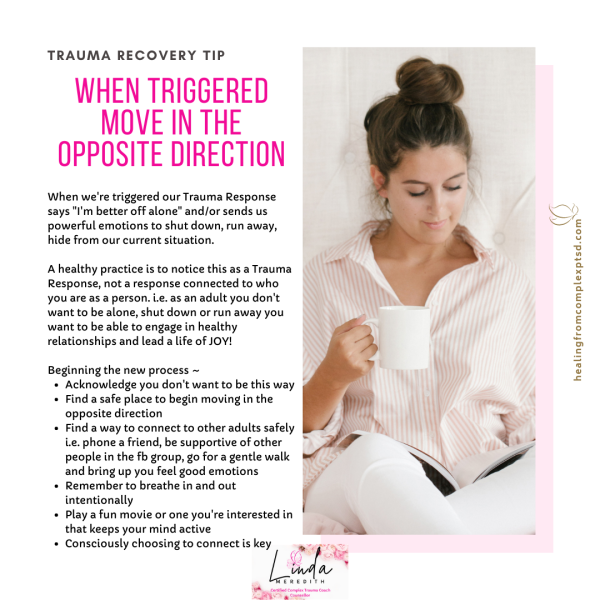Recognising Emotional Overwhelm
This article was posted on our original blog at Healing from Complex ptsd, September 6th 2021.
Overwhelmed, Underwhelmed, Triggered, Numb ~ Beginning Recovery
This crippling fear I often held silently within me until I could outsmart it enough to take the next action I wanted or needed to do. These days I can look back now and see how much of my life I lived in sheer terror and didn't even know it, because it was my normal. Yet, if you looked at the external side of my life, the parts you could see, my life was anything but fear filled. I broke the norms, left the state to live in a variety of places, worked in different industries, travelled spontaneously, so yes, it didn't appear I was living in a terrified state at all.
Complex Trauma however, is all about what we can't necessarily see. We can see outward behaviours, and not know what the internal workings are that are driving the behaviours. Why? Because complex trauma is, well, complex. It's so incredibly multilayered I still shake my head at how much I've had to learn so I can be well. The good news is because I've done the work into good health, it won't take you as long as me, nor do you have to become as unwell as I did either.
In the beginning I had no idea how the words overwhelmed, underwhelmed, triggered and numb impacted me internally. I didn't know how my brain was running the show and derailing all my efforts.
Have you been able to recognise if you're overwhelmed, underwhelmed, triggered or numb?
I've included part of an article from the goodtherapy.org website so you can get an idea of what it is to be emotionally overwhelmed. Let me know if you can relate to the article. I've added in a meme to help you begin to come off being emotionally overwhelmed. I believe in you, and I believe you can take your one next step to healing your complex trauma.

Emotional overwhelm may be caused by stress, traumatic life experiences, relationship issues, and much more. If you feel emotionally overwhelmed for an extended period of time, you may benefit from seeing a mental health professional.
SIGNS YOU ARE EMOTIONALLY OVERWHELMED
Emotional overwhelm occurs when the intensity of your feelings outmatches your ability to manage them. An individual is most likely to be overwhelmed by negative emotions, such as anger, fear, or guilt. However, people experiencing mania can be overwhelmed by euphoria.
If you are feeling overwhelmed, it may be difficult for you to pinpoint exactly why. Often there are many stressors contributing to emotional overwhelm rather than one particular event. Your emotions may bleed into seemingly unrelated parts of your life.
Here are some common signs that you are being overwhelmed by your emotions:
- You have a disproportionately big reaction to seemingly insignificant situations. For example, you may panic when you can’t find your keys.
- You feel physically ill or fatigued without knowing why.
- You have trouble focusing or completing even simple tasks.
- You find yourself withdrawing from friends and family.
- Your emotions colour your perception of the world. For example, intense grief may have you feeling sad even during pleasant occasions.
CAUSES OF EMOTIONAL OVERWHELM
You will likely feel a state of emotional overwhelm at some point in your life. Sometimes, this overload stems from a single big stressor. It is common to feel overwhelmed after surviving a traumatic accident or losing a loved one.
Yet overwhelm can also occur due to many smaller stressors. For example, missing your bus may not feel like too big of a deal by itself. But if you’ve been fighting with your family, having trouble sleeping, and are hungry from skipping breakfast, a missed bus can be the proverbial “last straw” of the day.
Some emotions may overwhelm you more easily than others. You may find it easier to manage your anger than to tolerate extreme fear or sadness. If you have many conflicting feelings at once, emotional overwhelm can be especially likely.
Some mental health conditions, such as anxiety or depression, have emotional overwhelm as a symptom.
CONSEQUENCES OF EMOTIONAL OVERWHELM
Emotional overwhelm can make it difficult to take care of yourself. You may forget meals, skip rest breaks, or struggle to fall asleep. These behaviours can in turn lower your ability to think rationally, making it even harder to cope with overwhelm.
If left unchecked, this cycle can lead to physical health problems. You may experience unexplained pain or develop persistent fatigue. As negative emotions increase, your body's ability to fight off infection may decrease.
Emotional overwhelm may also impact your social life. You may find yourself lashing out at others or avoiding conversation. These behaviours may strain your relationships with loved ones or professional colleagues.
HOW RECOVERY CAN HELP WITH EMOTIONAL OVERWHELM
Recovery is often a helpful way to sort through difficult emotions, especially those that occur as a result of stress or trauma. In recovery, you may be able to:
- Understand the roots of your overwhelming emotions
- Explore ways to self-soothe, such as meditation
- Address recurring stressors that contribute to overwhelm, such as marital conflict
- Learn coping skills to deal with any stressors that cannot be prevented
- Treat any mental health issues contributing to overwhelm
With each concern that is resolved, you will likely find that dealing with other stressors becomes easier. Even focusing on one or two issues can significantly reduce your distress. Even if your problems seem endless, know that therapy can help you manage your life one step at a time.

Courses
Let's Create Generational Change Together
To support this goal, Healing from Complex Ptsd allows you to:
- Access professional education and business support from industry leaders
- Learn a results driven approach to CPtsd recovery
- Discover a full library of ready to use tools and resources
Popular courses
Terms and Conditions
Developmental Trauma Self-Check
Over the past 12 months, how many and how often have you noticed:
-
I work hard to hold it together in public, then crash in private.
-
I struggle to name what I feel until it overloads me.
-
I say yes to keep the peace, then feel resentful or empty.
-
I feel loyal to people who do not treat me well.
-
I lose time or feel foggy when stressed.
-
I avoid closeness or over-attach quickly, then panic.
-
I find it hard to trust my own judgement.
-
I feel shame when I try to set boundaries.
-
I need external approval to feel steady.
-
I push through fatigue instead of pausing.
How to use this:
0–3 items often: you may be using a few survival patterns.
4–7 items often: consider paced support to rebuild safety and choice.
8–10 items often: a trauma-trained professional can help you restore stability and connection.
Brain Impact Self-Check
Over the past 12 months, how often have you noticed:
-
My mind jumps to what could go wrong, even in safe moments.
-
I find it hard to remember recent details when I am stressed.
-
Decisions feel risky, so I delay or avoid them.
-
I forget good experiences quickly and dwell on the bad.
-
I feel numb or overwhelmed, with little in-between.
-
I lose words when emotions rise.
-
I misread neutral faces or tones as negative.
-
I struggle to notice body signals like hunger, tension or breath.
-
I do better when someone I trust is nearby.
-
I feel different “versions” of me in different settings.
How to use this:
0–3 often: some protective habits; gentle self-care may help.
4–7 often: consider trauma-trained coaching to build daily brain skills.
8–10 often: a paced, brain-based plan can restore clarity, memory and confidence.
For formal assessment, use recognised measures:
-
ACE-IQ or ACE-10 for adversity history (education only on public pages).
-
ITQ (International Trauma Questionnaire) for ICD-11 PTSD/Complex PTSD.
-
DERS for emotion regulation, DES-II for dissociation, PCL-5 for PTSD symptoms.
-
PHQ-9, GAD-7 for mood and anxiety; OSSS-3 for social support.
